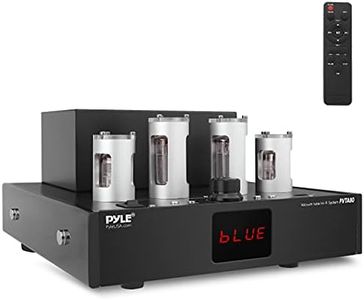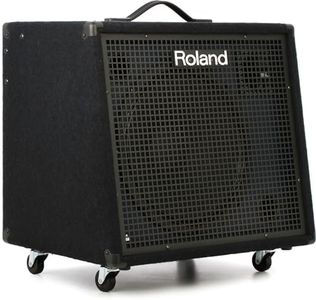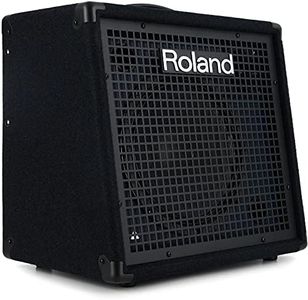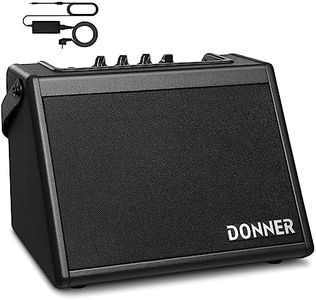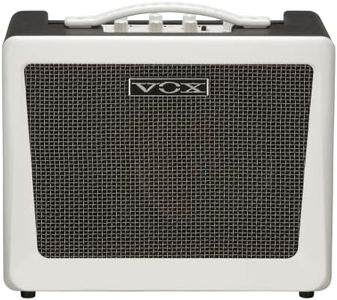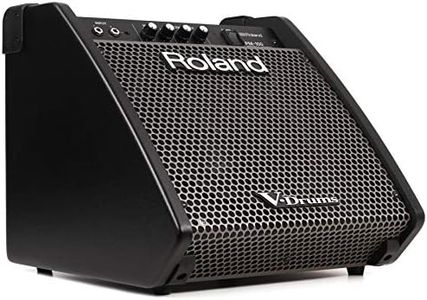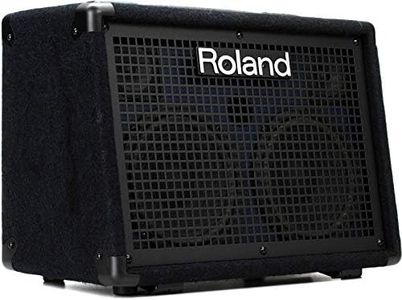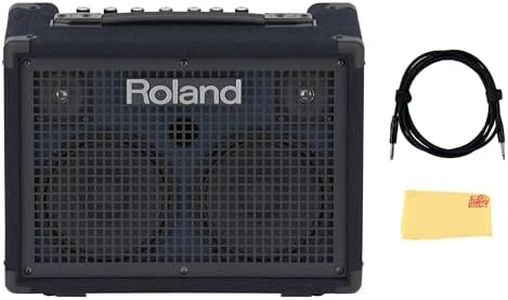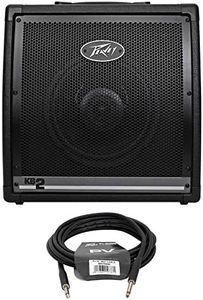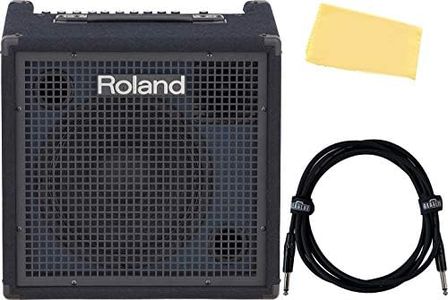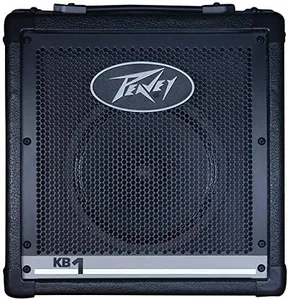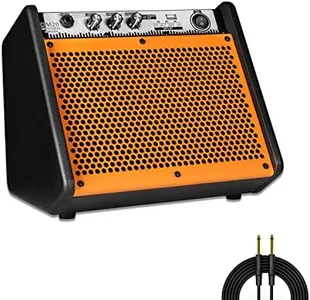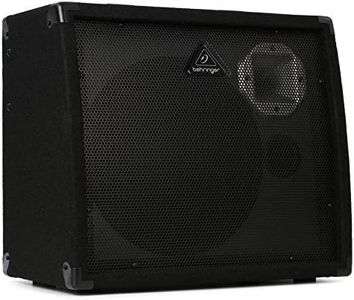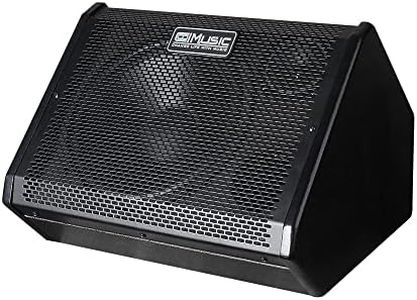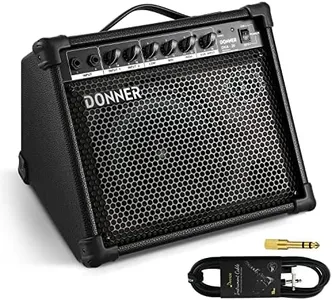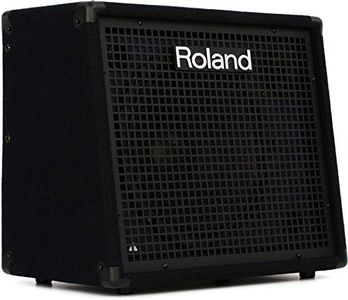10 Best Keyboard Amplifiers 2025 in the United States
Our technology thoroughly searches through the online shopping world, reviewing hundreds of sites. We then process and analyze this information, updating in real-time to bring you the latest top-rated products. This way, you always get the best and most current options available.

Our Top Picks
Winner
Roland 4-Channel Stereo Mixing Keyboard Amplifier, 200 watt (KC-600)
The Roland KC-600 is a powerful and compact 4-channel stereo mixing keyboard amplifier that delivers 200 watts of robust sound. One of its standout features is the custom two-way speaker system, which includes a newly developed 15-inch woofer and horn tweeter, ensuring rich bass and clarity, making it an excellent choice for both practice and live performances. The onboard mixer with four stereo input channels is particularly useful for musicians who need to connect multiple instruments or devices, allowing for a seamless setup. Additionally, the master EQ with a Shape switch lets users tailor their sound to suit various performance environments.
Portability is another strong point; its reduced weight, thanks to the redesigned power amp and universal power supply, makes it easier to transport to gigs. The removable casters are a nice touch for maneuverability. The inclusion of a variety of inputs and outputs, including XLR mic input and headphone output, caters well to diverse needs, and the ability to link another KC-600 for true stereo sound is great for larger setups.
The KC-600 excels in many areas, but its power output may be overkill for small, intimate settings, potentially resulting in overwhelming sound levels. For users seeking highly advanced built-in effects, this model doesn't have extensive options, focusing instead on solid core functionality. Additionally, those on a tight budget may find it on the pricier side compared to other options in the market. The Roland KC-600 is ideal for keyboard players who need a reliable, powerful solution for both home practice and live performances, offering excellent sound quality and practicality.
Roland KC-80 3 Channel Mixing Keyboard Amplifier, 50-Watt
Most important from
39 reviews
The Roland KC-80 is designed specifically for keyboard players searching for a reliable and portable amplifier. One of its standout features is its 50-watt power output, which is suitable for small to medium venues, making it a great option for live performances or practice sessions. The compact design and lightweight construction enhance portability, allowing musicians to transport it with ease.
Sound quality is a significant strength of the KC-80, thanks to its custom two-way speaker system with a newly developed 10-inch woofer and tweeter. This setup provides clear sound with good bass reproduction, which is essential for keyboards. The amplifier also includes three 1/4-inch input channels, an auxiliary input, and ample output options including an XLR mic input, making it versatile for various setups.
The built-in EQ controls allow users to adjust the sound output to match their specific preferences, which is a great addition for performers who want to fine-tune their audio. Furthermore, the metal jacks offer durability, which is important for musicians who frequently transport their gear. The power output is decent, but it may not be loud enough for larger venues or full band performances, which could limit its use for some users. While the speaker quality is impressive for the price, more advanced users may seek an amplifier with more extensive built-in effects or higher wattage for larger gigs.
Most important from
39 reviews
Donner Mini Electric Drum Amp 20W, Wireless Electronic Drum Amplifier Keyboard Speaker DDA-20 Portable for Home Practice
Most important from
373 reviews
The Donner Mini Electric Drum Amp DDA-20 is a compact and portable amplifier designed for home practice and small performances. It has a power output of 20 watts, which is suitable for personal use and small gatherings. The amplifier features a 6.5-inch woofer and a 2-inch tweeter, providing a decent range of sound with good bass response, thanks to its enclosed design.
It supports wireless connectivity, allowing you to control it via a multimedia knob, a convenient feature for modern musicians who like to connect their mobile devices easily. Additionally, it has a frequency response range from 20 Hz to 20 kHz, making it versatile for different musical instruments like electronic drums and keyboards. The amp is also rugged, with hard material edges and rubber pads, ensuring durability and stability during use.
However, it does not come with an audio cable, which you would need to purchase separately. This amplifier is ideal for beginners and casual musicians looking for a simple, portable, and effective practice amp for home use or small performances.
Most important from
373 reviews
Buying Guide for the Best Keyboard Amplifiers
Choosing the right keyboard amplifier is crucial for ensuring that your keyboard sounds its best, whether you're playing at home, in a studio, or on stage. A good keyboard amplifier will accurately reproduce the wide range of sounds that keyboards can produce, from deep bass notes to high-pitched melodies. When selecting a keyboard amplifier, consider the following key specifications to find the best fit for your needs.FAQ
Most Popular Categories Right Now
